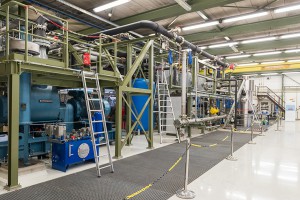July 2013, Vol. 240 No. 7
Features
New Multiphase Flow Lab To Enhance Oil, Gas Quality Assurance

International energy consulting and testing & certification company DNV KEMA earlier this year officially opened a new Multiphase Flow Laboratory (MPFL) in Groningen, the Netherlands.
The facility is designed to allow equipment manufactures and oil and gas companies to test, validate and calibrate multiphase technologies – e.g. separators and flow meters – for respectively the production of oil and gas, and the measurement and trading of gas.
As the MPFL is operating in a unique true-to-life environment, the facility is designed to help increase the accuracy of future multiphase flow meters, as well as the efficiency of future multiphase separators. As a result, developers said, it is expected that the economical and operational risks of oil and gas fields can be better managed. With the MPFL, DNV KEMA said they are responding to the increasing global demand for and supply of gas.
One of the continuous challenges of the upstream market is to reduce costs in order to optimize the production of gas and oil fields. Technology development is one of the key drivers in optimising and enabling growth of the upstream markets.
On the supply side, the production of gases in deep waters, oil sands or shale formations is complex and needs proven high-tech equipment. As oil and gas wells typically output a fluid mixture composed of oil, natural gas, (salt) water and even sand, plant operators need to know the actual flow rates of these fluids to ensure that the gas and oil quality meet the contractual requirements.

Multiphase technologies help to determine these flows these flows. By improving multiphase technologies the technical and financial reliability of oil and gas production will increase. As a result, the downtime of production plants can be limited, the integrity and safety of the local oil & gas infrastructures improved, and the life-time of an oil and gas field extended.
On the demand side, there is a growing need for gas – in particular liquefied natural gas (LNG) – for the generation of power and the fuelling of growing economies. This will lead to higher intercontinental gas trading and transmission volumes. As small deviations of large measured volumes cause financial risks, the accuracy of gas meters is crucial. The MPFL is capable of validating and calibrating multiphase flow meters to ensure the quality of the measurements.
DNV KEMA’s Multiphase Flow Laboratory Manager, Ronald ten Cate, was distinct about the value of this facility: “A number of techniques exist for making these “multiphase flow measurements”, but the technology is still immature and equipment needs to be developed further.

“Customer feedback told us this development was being held back by a lack of suitable facilities for testing new products. A number of customers have already been contracted or have shown their interest in our new laboratory. In this respect we have a strong ambition to develop new products and services for the medium and long term globally.”
DNV KEMA has invested in the upgrade of the existing “wet gas” closed loop facility to a full Multiphase flow test lab. It will be capable of recreating the kind of conditions equipment would face in the field. This includes a full range of multiphase fluid compositions at realistic temperatures, pressures and flow rates. It will also accelerate industry efforts to develop standards for equipment and testing protocols.
For more information on DNV KEMA’s MPFL visit http://www.dnvkema.com/services/gcs/gas-facilities/MultiPhase-flow-laboratory.aspx.





Comments